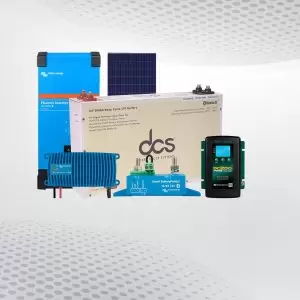Are you ready to elevate your RV experience and hit the open road with confidence? Whether planning a weekend getaway or a cross-country expedition, having reliable power is essential for making every moment memorable. Enter lithium RV battery — the game-changer that promises longer-lasting energy, lighter weight, and greater efficiency than traditional lead-acid options. In this comprehensive guide, we’ll dive deep into everything you need to know about RV lithium batteries: how they work, why they’re transforming the way adventurers travel, and tips on selecting the perfect battery for your rig. Join us as we unlock the secrets of powering your adventure on wheels!
Introduction to RV Lithium Batteries
Picture this: you’re on the open road, surrounded by breathtaking landscapes and a sense of freedom only an RV can provide. But wait, one crucial element can make or break your adventure—your power source. Enter RV lithium batteries, the game-changer for every modern traveller.
Gone are the days when traditional lead-acid batteries dominated the scene. With technological advancements, lithium batteries have emerged as a superior alternative for RV enthusiasts seeking reliability and efficiency. They’re lightweight, long-lasting, and capable of powering all your essential gadgets while you explore nature’s wonders.
Whether you’re planning a weekend getaway or an extended road trip across state lines, understanding how to harness the power of these remarkable energy cells is vital. Dive into our comprehensive guide to learn everything you need about RV lithium batteries—and discover how they can elevate your adventures to new heights!
Comparison between Lithium Batteries and Traditional Lead-Acid Batteries
The differences between lithium batteries and traditional lead-acid options are striking. Lithium batteries boast a higher energy density, allowing for more power in a smaller package. This means less weight and space in your RV. While initially cost-effective, lead-acid batteries have shorter lifespans. They typically last 3-5 years, compared to lithium’s impressive 10-15 years. Charging time is another major factor. Lithium batteries recharge quickly—often achieving full capacity in just a few hours—while lead-acid can take much longer.
Additionally, lithium batteries can be discharged deeper without damage. If drained below 50%, lead-acid models risk significant performance loss. If you value efficiency and longevity on the road, these distinctions are crucial when choosing. Each option has its place, but understanding their unique capabilities will guide you toward the best fit for your adventures.
Benefits of Using Lithium Ion Deep Cycle Battery
Using lithium ion deep cycle battery in your RV has numerous benefits. These advanced batteries offer various advantages over traditional lead-acid batteries, making them a popular choice among RV enthusiasts.
Lightweight and Compact Design:
One of the significant benefits of lithium ion deep cycle batteries is their lightweight and compact design. These batteries weigh significantly less than traditional lead-acid batteries, making them ideal for RVs where every pound matters. Additionally, their compact size allows for easier installation and more flexibility in placement within the vehicle.
Longer Lifespan:
Lithium-ion deep-cycle batteries have a longer lifespan than lead-acid batteries, which typically last only 200-300 cycles. These advanced batteries can last up to 5000 cycles or more with proper maintenance. This means they will need to be replaced much less frequently, saving you time and money in the long run.
Fast Charging:
Another advantage of lithium-ion deep-cycle batteries is their fast charging capability. These batteries can charge up to five times faster than traditional lead-acid batteries, allowing you to return to the road quickly after stopping at an RV park or campground.
High Energy Density:
Lithium-ion deep-cycle batteries have a higher energy density than lead-acid batteries, meaning they can store more power in a smaller space. This makes them perfect for powering appliances and electronics while on your RV adventure without wasting too much valuable storage space.
Factors to Consider When Choosing an RV Lithium Battery
Choosing the right RV lithium battery involves several important factors. First, consider its capacity. This is measured in amp-hours (Ah) and indicates how much energy the battery can store. A higher capacity means more power for longer trips. Next, consider voltage. Most RV systems operate on 12-volt batteries, but your specific setup may require a different configuration.
Weight and size are crucial, too. Lithium batteries tend to be lighter than lead-acid options, which can affect your vehicle’s overall weight and storage layout. Cost shouldn’t be overlooked either. While lithium batteries typically have a higher upfront price, their longevity and efficiency often make them a worthwhile investment. Lastly, check for compatibility with your existing system to ensure optimal performance without hiccups during your travels.
– Capacity
When choosing an RV lithium battery, capacity is a crucial factor to consider. It refers to the energy stored in the battery, typically measured in amp-hours (Ah). Higher capacity means more power for your appliances, lights, and devices. Think about your needs while on the road. Are you planning longer trips? Do you use multiple devices simultaneously? A higher-capacity battery will ensure uninterrupted service during your adventures.
However, it’s essential to balance capacity with weight and size. Some batteries offer impressive capacities but may be bulkier or heavier than others. Always check specifications to match them with your RV’s requirements. Keep in mind that efficiency plays a role, too. Lithium batteries maintain their capacity better under various loads than traditional lead-acid options. So when you’re deep into nature enjoying life off-grid, having sufficient power makes all the difference for comfort and convenience.
– Voltage
Voltage is a crucial factor when selecting an RV lithium battery. Most RVs operate on a 12-volt system, so your battery must match this standard for optimal performance. Choosing a lithium battery with the right voltage enhances efficiency and ensures your appliances run smoothly. A mismatch can lead to poor power delivery or even damaged equipment.
Higher voltage options, such as 24 volts or 48 volts, are available, offering advantages like reduced current draw and improved energy transfer over longer distances. This setup can be beneficial if you use high-demand devices while off-grid. Always check compatibility with your existing electrical system before making a decision. The right voltage supports reliable operations and maximizes the lifespan of the battery and your RV’s components.
– Weight and Size
Regarding RV lithium batteries, weight and size are crucial in your adventure. Unlike traditional lead-acid batteries, lithium options are significantly lighter. This means you can save valuable payload capacity for other essentials. A smaller footprint also translates to easier installation. Many RV owners appreciate the compact design of lithium batteries, facilitating creative placement within their vehicles. You won’t have to sacrifice storage space or rearrange your gear just to accommodate bulky battery systems.
Additionally, the reduced weight enhances overall vehicle efficiency and handling. A lighter load can improve fuel economy during travel days—a win-win for budget-conscious adventurers. Choosing the right size doesn’t just affect performance; it impacts how seamlessly you integrate power solutions into your setup. Always consider where you’ll place the battery and how often you’ll be on the move with your rig.
Proper Care and Maintenance of Lithium RV Batteries
Proper care of your lithium RV batteries is essential for their longevity and optimal performance. Start with the charging procedures. Lithium batteries require a specific charger to ensure they receive the correct voltage. Always follow manufacturer recommendations and avoid overcharging. Storage also plays a vital role in battery health. Keep your batteries at room temperature, ideally between 32°F and 95°F (0°C to 35°C). If you’re not using them for an extended period, store them at around 50% charge to prevent capacity loss.
Regularly check connections for any corrosion or wear. Clean terminals gently with a soft cloth if needed, but always disconnect power before doing so. Monitoring battery management systems can help track health metrics like state of charge and temperature. Staying informed about these factors ensures you get the best out of your investment without unnecessary risks.
Charging your RV lithium battery is crucial for optimal performance. Always use a charger specifically designed for lithium batteries. This ensures safe and efficient charging. Monitor the state of charge regularly. Most lithium batteries have built-in management systems that display this information. Keep an eye on it to avoid overcharging, which can damage the cells.
Storing your RV lithium batteries properly is essential for maximizing their lifespan. Always keep them in a cool, dry place. Extreme temperatures can affect performance and safety. Ensure the batteries are charged to about 50-70% when not used. This level helps maintain optimal health without risking damage from over-discharging or excessive charging. Avoid leaving your batteries connected to any power source during long-term storage. Disconnecting them prevents trickle charging, leading to issues down the line.
Top Brands of RV Lithium Batteries on the Market
Several brands consistently stand out when it comes to RV lithium batteries. Battle Born Batteries, renowned for their reliability and innovation, has gained a loyal following among RV enthusiasts. Their products are known for durability and impressive performance.
Renogy is another key player in the market. It offers a range of lithium options that cater to different needs and budgets, making it popular among both new users and seasoned adventurers.
Victron Energy should be on your radar if you’re looking for high-capacity solutions. Their advanced technology ensures efficient power management, which is ideal for long trips.
Lastly, AIMS Power is gaining traction with affordable yet powerful batteries designed specifically for recreational vehicles. Their products provide excellent value without compromising quality or performance.
Conclusion
Upgrading to a lithium battery for your RV can significantly enhance your travel experience. These batteries offer longer life cycles, faster charging times, and greater efficiency than traditional lead-acid options. The lightweight design means you get more power without the added bulk. Imagine being able to run your appliances and devices longer while spending less time worrying about recharging. With a lithium battery, all of this becomes possible. You’ll also enjoy better performance in extreme temperatures and reduced maintenance requirements.
FAQ’S
Are there any safety concerns with using RV lithium batteries?
Lithium batteries have been known to catch fire or explode if not used properly, but technological advancements have made them much safer than previous models. Modern lithium batteries have advanced management systems that monitor temperature, voltage, and current flow to prevent overheating and overcharging. It is important to follow manufacturer guidelines for installation and usage to ensure safe operation.
How do I maintain my lithium RV battery?
Unlike lead-acid batteries, which require regular maintenance, such as checking water levels, lithium batteries are virtually maintenance-free. However, it is important to regularly check the connections and keep them clean and free from corrosion. It is also recommended that you store your RV lithium battery at around 50% charge when not in use for extended periods.
Can I use my RV’s generator or solar panels to charge my lithium battery?
Yes, you can charge your RV lithium battery using any power source compatible with the battery’s charging requirements. However, lithium batteries can handle higher charging currents than lead-acid batteries, so you may need to adjust your charging system accordingly.



